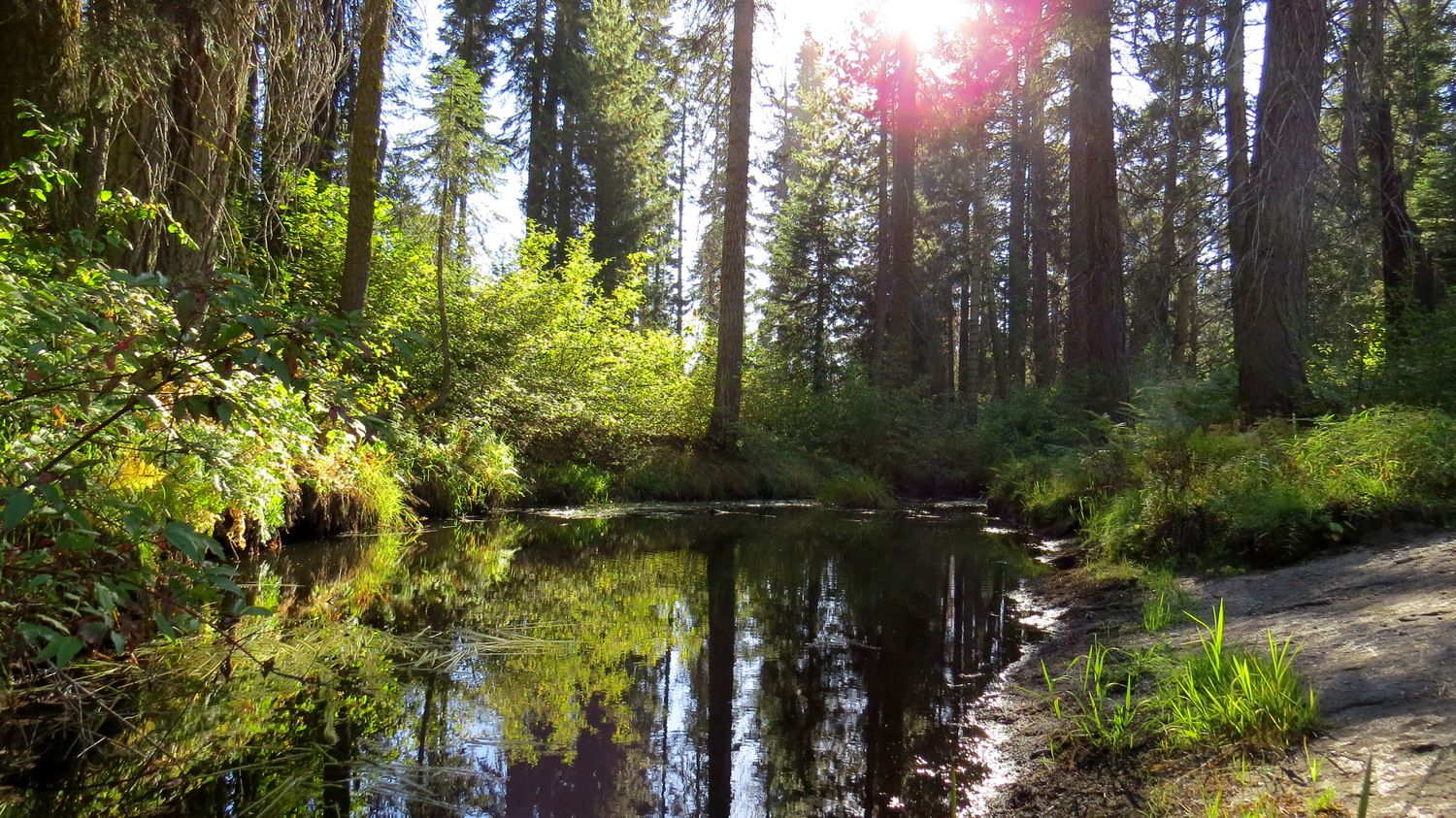This moderate looping hike features the world’s tallest pine, the sugar pine. As the trail follows the southern rim of the Giant Forest Plateau between Moro Rock and Crescent Meadow, you’ll see numerous examples of this graceful tree. You’ll also enjoy sweeping views from Bobcat Point, a stop at Crescent Meadow, and a beautiful pond along Crescent Creek.

Giant Forest is justly famous for having the largest specimens of the largest tree on the planet. These trees are so preposterously large, that anything set next to it seems minuscule in comparison. This optical illusions often prevents folks from realizing that, in addition to the sequoias, Giant Forest also plays host to the world’s largest species of pine, the sugar pine.

A mature sugar pine
This graceful pine tree received its name due to the sweet flavor of its sap, which John Muir was reported to prefer to maple syrup. The sugar pine can reach up to 269′, which makes it a near equal to the sequoia, at least in terms of height. In addition to being the tallest of all pines, the sugar pine also has the largest pine cone of any conifer. These beautiful cones can grow up to two feet in length and are often found littering the forest floor beneath larger trees.

Unfortunately, the sugar pine, unlike it’s more drought tolerant cousins in the yellow pine family (Jeffrey, ponderosa, and lodgepole), is frequently vulnerable to bark beetle attacks. Bark beetles attacks tend to intensify during periods of drought, during which times trees are less able to produce the sap that wards the beetles off. During the drought periods of the early 2000’s and 2010’s, many sugar pines, including the world’s largest in Yosemite, fell victim to bark beetle attacks.

Hikers on Moro Rock
While there are many dead and dying sugar pines along this path thanks to four of the worst drought years ever recording, there are still abundant examples of this beautiful pine interspersed along this moderate, lollipop-loop route. You’ll also catch some great views over Kaweah Canyon with optional side trips along the opening stretch of the High Sierra Trail and Crescent Meadow.

Black Oak on the Sugar Pine Trail
Starting from the Moro Rock parking lot and trailhead, find the unassuming trail sign and follow the trail down a short drop into thick forest. At .2 mile, the trail bends to the left into a gloomy ravine. Here, you’ll get a nice lesson in slope aspect. This ravine, whose slopes face east and northeast, holds moisture much longer than the sunnier, south-facing slopes you’ll travel on for most of the route. As a result, and in addition to a small stream, this ravine holds the only sequoias you’ll find on the route. This spot represents the southernmost limit of the Giant Forest sequoia grove.

One of a handful of Giant Sequoias on the trail
You’ll weave into and then out of another ravine at .5 mile before the trail straightens out. Once you begin traveling due east, the vegetation changes dramatically from dense, cool sequoia and fir forest, to sunny, open cedar, Jeffrey pine, and sugar pine. Manzanita and aromatic mountain misery provide colorful red and green splashes to the understory, while granite outcrops lend this stretch of forest a much more rugged look.

Paradise Peak and the Castle Rocks from Bobcat Point
At .9 mile, the trail splits. Take the right path leading to Bobcat Point. Commence a steep climb up to this small rock outcrop. From here, you’ll have a nice view of Moro Rock due west, with the deep, yawning chasm of Kaweah Canyon unfurling before you. Directly opposite the canyon lie the Castle Crags some 3,000′ higher than your vantage. If the air is clear, you might spot the Lake Kaweah reservoir just west of Three Rivers.

Crescent Meadow in Fall
Continue past Bobcat Point to climb another 200′ toward a junction with the High Sierra Trail and Crescent Meadow trails. The Sugar Pine Trail terminates at the High Sierra Trail. Turn left and follow it to the paved Crescent Meadow Trail. The Crescent Meadow viewpoint is a good 50 yards or so to your right, and you can easily tack on the half-mile loop around the meadow to this trip.

Dogwoods on the Sugar Pine Trail
To follow the return portion of the loop, look for a somewhat obscure, unmarked trail just before the bridge crossing over a creek draining Crescent Meadow. Don’t worry too much if you miss it; you’ll end up at the Crescent Meadow parking lot, and you can look for another access path to the Sugar Pine Trail on the south end of the parking lot.

Crescent Creek
The trail now drops into a ravine along the north bank of Crescent Creek. A 2 miles, there’s an enchanting spot where the creek collects in a small pool. Provided the mosquitoes aren’t around, this is a perfect spot for a rest or a picnic. The loop ends just over .1 mile beyond the pool. At this point, you’ll rejoin the main trail to retrace it back to the start.

If you’ve got some energy left over, consider climbing the impressive staircase up to the summit of Moro Rock for a fuller expression of the Kaweah Canyon/Great Western Divide view.
Tags: Bobcat Point, Crescent Creek, Crescent Meadow, Giant Forest, Kaweah Canyon, Moro Rock, Sequoia National Park, Sugar Pine Trail, sugar pines, transit accessible












